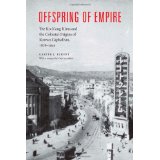Let op! Om diverse redenen kan de voorraad die hier op de website wordt getoond soms niet overeenkomen met de werkelijk aanwezige voorraad in de winkel.
Offspring of Empire
€33.75
According to conventional interpretations, the Japanese annexation of Korea in 1910 destroyed a budding native capitalist economy on the peninsula and blocked the development of a Korean capitalist class until 1945. In this expansive and provocative study, now available in paperback, Carter J. Eckert challenges the standard view and argues that Japanese imperialism, while politically oppressive, was also the catalyst and cradle of modern Korean industrial development. Ancient ties to China were replaced by new ones to Japan – ties that have continued to shape the South Korean political economy down to the present day. Eckert explores a wide range of themes, including the roots of capitalist development in Korea, the origins of the modern business elite, the nature of Japanese colonial policy and the Japanese colonial state, the relationship between the colonial government and the Korean economic elite, and the nature of Korean collaboration. He conveys a clear sense of the human complexity, archival richness, and intellectual challenge of the historical period. His documentation is thorough; his arguments are compelling and often strikingly innovative.
Auteur: Eckert, Carter Jaar: 2014 ISBN: 9780295993881 Pagina's: 416 Taal: English Uitgever: University of Washington Press Uitgever stad: Washington Verschijningsdatum:






